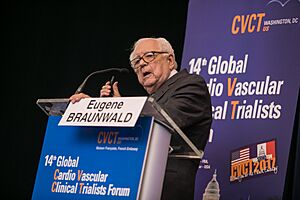Eugene Braunwald facts for kids
Quick facts for kids
Eugene Braunwald
|
|
|---|---|

Braunwald, 2017
|
|
| Born | August 15, 1929 Vienna, Austria
|
| Nationality | American |
| Alma mater | New York University |
| Spouse(s) |
Nina Starr
(m. 1952; Elaine Smith |
| Children | 3 |
| Awards | American College of Cardiology Distinguished Scientist Award (1986) |
| Scientific career | |
| Fields | Medical research, Cardiology |
| Institutions | National Institutes of Health |
Eugene Braunwald (born August 15, 1929) is a famous American heart doctor who was born in Austria. He has made many important discoveries about the heart and how to treat heart diseases. He is known for his work in understanding and treating heart conditions like heart failure and heart attacks.
Contents
Early Life and Education
Growing Up and Becoming a Doctor
Eugene Braunwald was born in Vienna, Austria, on August 15, 1929. He studied at New York University, where he earned his first degree and then his medical degree. After that, he completed his training in internal medicine at Johns Hopkins School of Medicine.
He became interested in heart medicine while he was a medical student. He learned a lot by working at a heart clinic. He also took special courses in Mexico City at the National Institute of Cardiology. He believed that learning directly from patients was the best way to become a good doctor.
Family Life
In 1952, Dr. Braunwald married Nina Starr, who was also a very talented doctor and researcher. She was a surgeon who worked on the chest. They had three children together. Nina Starr Braunwald passed away in 1992. Later, Dr. Braunwald married his second wife, Elaine.
Career and Contributions
Leading Heart Research Centers
Dr. Braunwald has had a long and important career in medicine. He was the chief of cardiology and clinical director at the National Heart, Lung and Blood Institute. This is a big research center that is part of the National Institutes of Health in the United States.
From 1968 to 1972, he helped start the Department of Medicine at the University of California, San Diego. He then moved to Brigham and Women's Hospital and Harvard Medical School in 1972. He led the Department of Medicine there until 1996. Many top scientists who study medicine worked in his department during his time as leader.
Important Discoveries About the Heart
Dr. Braunwald's work has greatly increased what we know about heart diseases. He has published over 1000 articles in medical journals. His research has helped us understand congestive heart failure, coronary artery disease, and valvular heart disease. These are all different types of heart problems.
He was a key person in the TIMI (Thrombolysis in Myocardial Infarction) studies. These studies helped doctors understand that heart attacks happen when blood clots form on hardened arteries. This understanding led to new treatments that can reduce damage to the heart during a heart attack.
Writing Medical Textbooks
Dr. Braunwald is also the editor of a very important textbook called Braunwald's Heart Disease. This book is used by heart doctors all over the world and has been updated many times. He also helped edit Harrison's Principles of Internal Medicine, another major medical textbook, for more than 30 years.
Awards and Recognition
Dr. Braunwald has received many awards for his amazing work in medicine.
- In 1966, he received the Jacobi Medallion for his great achievements in medicine.
- In 1986, he was given the Distinguished Scientist Award by the American College of Cardiology.
- In 2001, he received The Warren Alpert Foundation Prize.
- In 2002, he shared the King Faisal Prize for Medicine with Professor Finn Waagstein.
- In 2004, he was the first person to win the Libin/AHFMR Prize for Excellence in Cardiovascular Research.
- In 2010, he received an honorary degree from the University of Rochester.
- In 2013, he received another honorary degree from the University of Salerno in Italy.
Dr. Braunwald's contributions have been recognized by his election to the U.S. National Academy of Sciences. Harvard Medical School also created a special position in his name to honor him. The American Heart Association also created an award for mentoring young scientists in his honor.
See also
 In Spanish: Eugene Braunwald para niños
In Spanish: Eugene Braunwald para niños
 | Sharif Bey |
 | Hale Woodruff |
 | Richmond Barthé |
 | Purvis Young |

